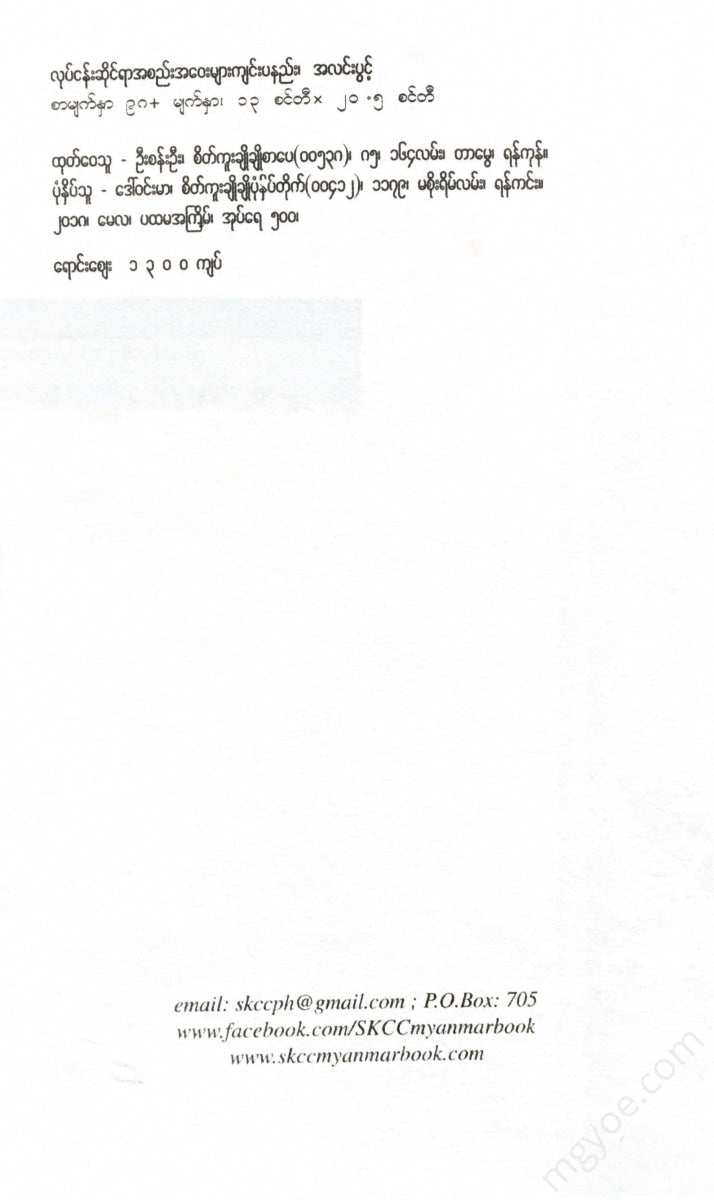စိတ်ကူးချိုချိုစာပေ
Light Up - How to Hold a Business Meeting
Light Up - How to Hold a Business Meeting
Couldn't load pickup availability
To ensure that business meetings can be held effectively and successfully
Holding a meeting is a great way to make business decisions, share ideas, and work together to actively engage your team, business unit, or department. However, holding a meeting should not be used as an opportunity to show off how good your team is or to brag about your leadership and management skills. Sometimes we inadvertently hold meetings that are not appropriate for the purpose of a meeting.
The tips and guidelines in this book provide you with the fundamentals to help you hold effective meetings and develop your ability to work productively.
To successfully hold an effective meeting, you will need to take the following steps.
- Accurately and accurately drafting the meeting agenda .
- In order to successfully hold the meeting, select and invite the appropriate people, and then carefully check whether the invitees have responded positively to the meeting.
- Your business plans - Management of points to discuss.
- Discussing programs that can energize your team.
- Resolving conflicts that arise within the business.
- Making precise and solid decisions.
- Checking whether the rules set after the meeting are actually followed.
Conducting business meetings effectively and successfully
Almost all of us attend meetings, present, discuss, and negotiate at a specific location and time set by the meeting organizer.
The purpose of a meeting is to make important decisions about our business, but because we do not plan in advance what topics, issues, and issues to discuss and what decisions to make, and because we do not collect important information, we often have to choose between these issues during the meeting, which means we cannot fully focus on the issues we have to decide on and make clear decisions.
We plan in advance the points to be discussed and the issues to be decided at the meeting, but sometimes we forget to invite the head of the association or the leader, or we don't know if we should invite them.
The topics presented in the meeting need to be actionable and there must be fairness in the discussions and decisions. By holding productive meetings, we can successfully solve problems that arise within the department, make solid decisions, develop plans, and motivate our team members to work hard and be proactive.
If a meeting is not productive for us, it will not only waste time but also delay the important work we are doing.
The most significant and profound aspect of a successful meeting is that all attendees are seated comfortably in the same place, in the same room, before the meeting begins and after it has concluded.
After a successful meeting, most people don't immediately leave, but instead negotiate and exchange friendly greetings to ensure more effective discussions in future meetings.
Preparing for your meeting
If you are going to lead a meeting, you need to carefully consider the purpose of the meeting, develop an effective meeting agenda, invite those who must attend the meeting, arrange adequate seating for attendees, write down and review the topics to be discussed at the meeting, and prepare the issues to be decided in advance.
If you have the right features for a meeting... you don't need to worry about any extras. Another thing you should keep in mind is that if you are going to hold a meeting, you have to accept the fact that you have to follow a set of rules.
If you can plan the best basic preparations for each meeting in advance, you will be able to hold important meetings consistently.
Why are you holding a meeting?
Once a meeting is held, there will already be a purpose for holding the meeting.
For example, is the purpose of your meeting to confuse everyone in attendance, to resolve current issues, or to provide important information to your team?
If you are going to discuss important issues... what issues will be the main focus of the discussion, why will it be discussed? Will you make important decisions or will you announce the transfer of responsibilities and acceptances for individual nominees... you need to plan in advance.
For example, if you are leading a meeting and inviting someone to come in to discuss a specific project... you need to consider how you will respond to the feedback. If you are not attentive to the diverse opinions of the meeting participants or if you are oblivious to them, you are likely to be an annoyance to everyone present.
The proper purpose of any meeting requires mutual respect and trust between all participants and the facilitator... with the other person providing additional input as needed.
If you can prepare the above important points carefully and without mistakes, you will be able to hold meetings flawlessly, with the necessary features and complete according to the situation, time, and business needs.















